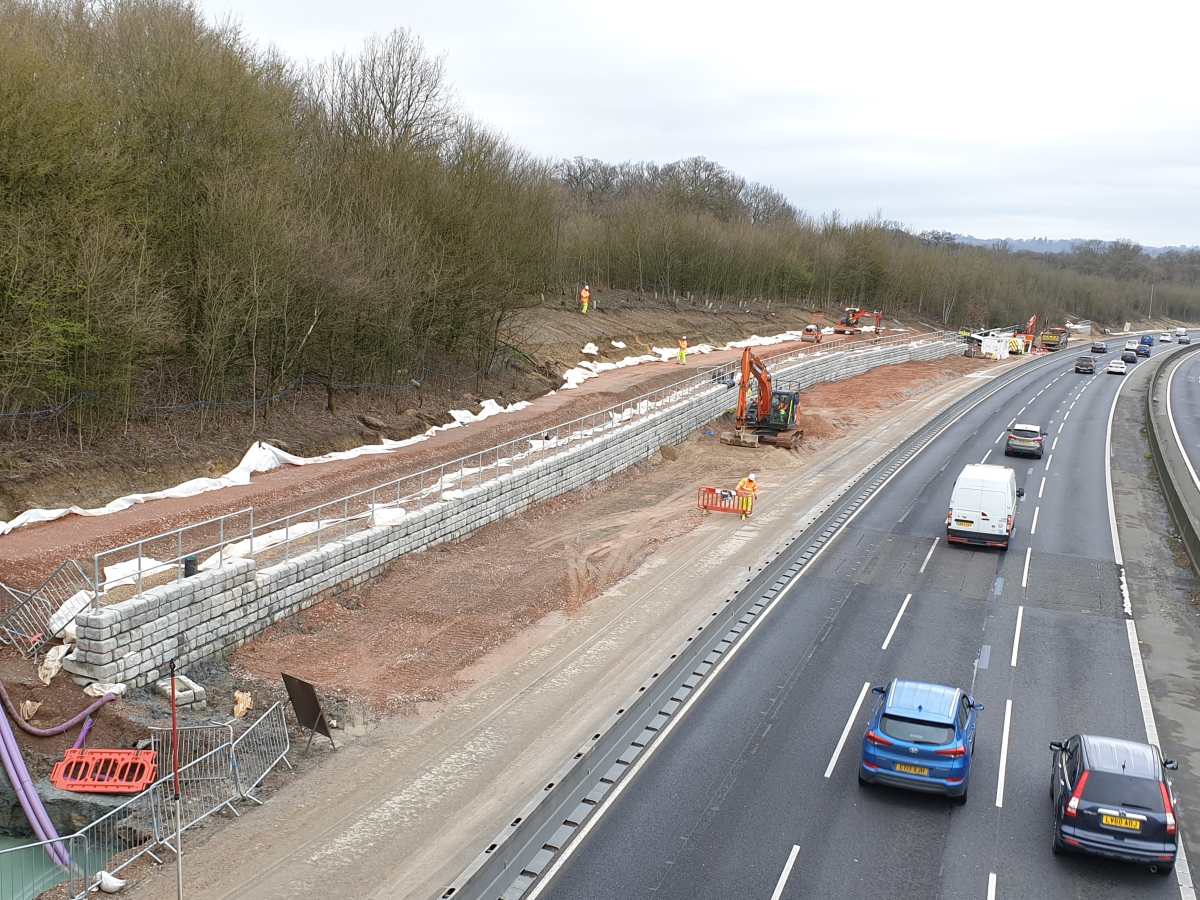Location
M20 (Junctions 3 to 5) and M23 (Junction 8 to 10), Maidstone, ME17 1SS
Client
National Highways
Architect
Jacobs Atkins JV
Kier Highways’ managed motorway upgrades for the M20 (junctions 3 to 5) and the M23 (junctions 8 to 10) involved converting most of the hard shoulders into traffic lanes to create extra capacity and installing additional gantries with electronic information signs, signals and CCTV cameras to give information about road conditions and speed limits.
Converting the hard shoulders into traffic lanes included work on the verges that needed to be widened to accommodate extra lanes, emergency refuge areas and gantry bases, with varying topography and demands along the total 27.5km (17 miles) of road. Kier Highways had started searching early in the planning process for an innovative retaining wall solution to avoid land acquisition for the upgrades.
Marshalls Civils & Drainage Solution
Marshalls’ HAPAS‐approved Redi‐Rock modular block system was specified after extensive research with project designer Jacobs Atkins Joint Venture which analysed the structural and geotechnical capabilities, and costs, of various solutions for walls under 1.5m and up to 3.5m.
Potential wall systems analysed for the project included cantilever walls, sheet piles driven from temporary platforms and from road level with lane closures, contiguous bored pile walls, and gravity walls constructed from precast modular blocks or from gabions.
Redi‐Rock was specified as the gravity walls rely on the sheer mass of the concrete blocks, as well as the patented interlocking technology, to withstand the pressure of the retained earth.
In addition, the Redi‐Rock portfolio is extensive, with blocks ranging in weight from 530kg to 2,190kg in weight and from 710mm to 2,440mm in width, meaning gravity walls over 6m high can be built in any weather ‐ a real bonus in the UK.
Compared to the other options analysed, Marshalls’ precast Redi‐Rock system was considerably less expensive compared to the cast‐in‐situ alternatives that require multi‐phase construction and costly formwork. Redi‐Rock also eliminated the requirement for additional land purchases and lessened excavation by being constructed in a tight footprint.
In addition, the Marshalls’ system also enabled installation efficiencies, with Kier’s own team installing the Redi‐Rock gravity walls without special equipment at a rate of 75m2 (800ft2) per day as the blocks are non‐grouted and dry stacked. As well as reducing onsite work time, this also improved safety alongside the live motorways and won Kier a nomination for a 2020 Constructing Excellence SECBE Award in the Civils Project category, with the contractor going on to win the award in the Best Health and Safety in Construction category.
The use of Marshalls’ Redi‐Rock system, which is UKCA marked for safety and performance, was also an exemplar of collaborative working as Kier had requested a custom solution to expedite installation through offsite construction. This included modifying the top block for walls over 1.5m to include a socket for guardrails that would allow safe access for inspections and maintenance.
The guardrails were installed under factory‐controlled quality systems, providing additional time savings on site construction and enhancing the quality of the end result, which gave the texture of natural stone for enhanced aesthetics. The use of Redi‐Rock also helped Kier with its green credentials, for as well as eliminating the waste of onsite formwork and reducing excavation that disrupts habitat, the system was fabricated with 25% PFA materials and has a design life of 120 years.
The retaining wall solution has helped Kier Highways to savings of £16 million, or 5.6% of the total project budget.


